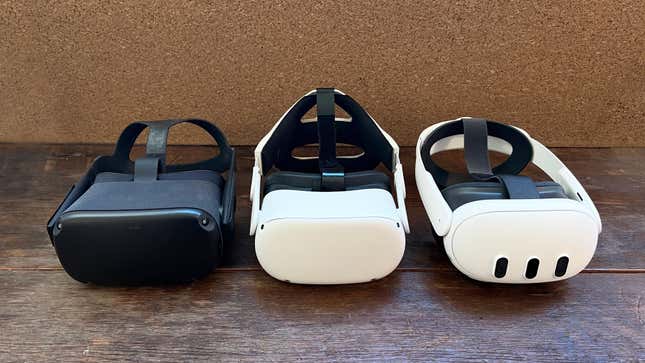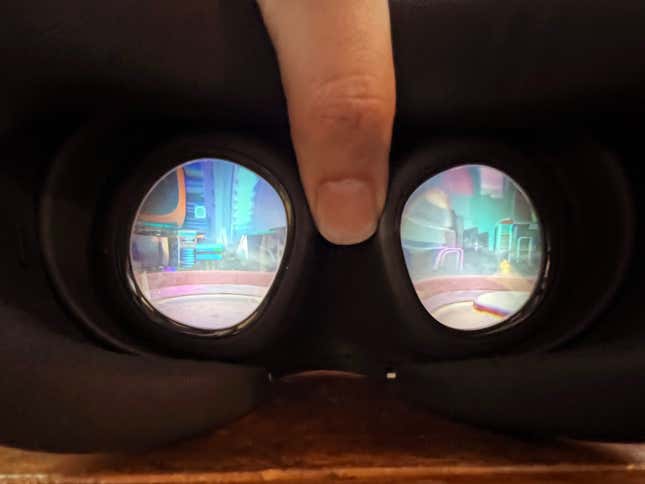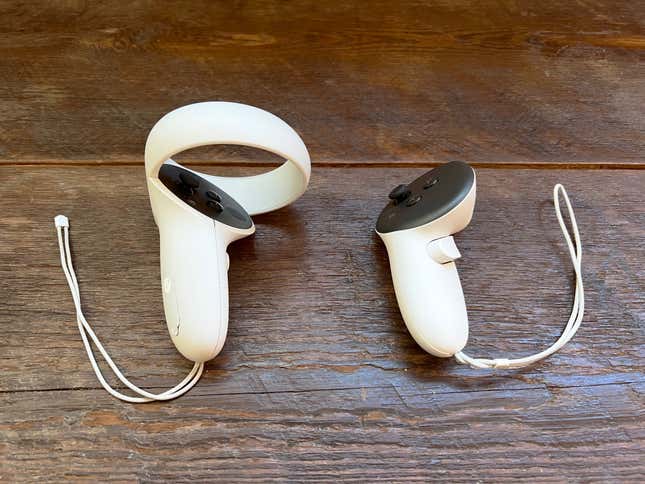I’ve tried them both, and the new Meta Quest 3 is no Apple Vision Pro. At least as far as presenting a hyper-realistic mixed reality experience that overlays virtual objects and experiences into the real world while preventing you from bumping into the furniture. And for $500, versus $3,500 for Apple’s still-unreleased headset, that’s perfectly fine.
The fact is that the Quest 3’s biggest selling point, its color passthrough cameras, are more than good enough to wow even jaded VR veterans. No, you won’t forget you’re wearing a headset, as I sometimes did with my (highly curated) Apple Vision Pro demo, but I could walk around easily, read the time on my watch, mostly read text on my phone, and otherwise interact with the real world.
See more: Meta Quest 3 in Pictures
It’s too bad there are only a handful of Quest apps that take advantage of this new feature. That could be because the Quest ecosystem, like Apple’s app store, is a walled garden filled with for-purchase games and productivity apps. At least there are a good number of free demos and experiments, which somewhat makes up for the fact that so many Quest apps feel expensive at $40-50.
The star right now is First Encounters, a free game that scans your room and sends little fuzzy invaders into it through the walls and ceiling. It’s not reinventing the wheel, but the whole thing comes together in a very impressive way, including mapping not only the walls and ceiling in your room but the furniture, too.
The Quest 3 itself is more expensive than its predecessors, starting at $500 and going up once you add extras like more onboard storage ($150) and a better headstrap ($70). The default headstrap, just a couple of cloth straps with velcro, is embarrassing.

The Quest 2 launched at $300 back in 2020, so this is a sizable jump, but you can also look at it as costing the same as a PS5. Since this is primarily going to be used as a game device, no matter what metaverse advocates say, that’s an apt comparison, and it certainly feels like you’re getting $500 worth of technology.
Besides being smaller and better balanced on your head than the Quest 2, the Quest 3 has a faster Snapdragon XR2 processor and 8GB of RAM (up from 6GB), and the per-eye resolution jumps from 1,832 x 1,920 to 2,064 x 2,208, which may not sound like a lot, but when all these updates are put together, it’s a smoother, faster, better experience overall.

In fact, just as the character creation tool in games like Baldur’s Gate 3 can suck you in for hours, I loved just going through the process of scanning various rooms to set up the Quest’s boundaries. It’s a huge improvement over the draw-it-yourself version on most previous VR hardware, and the ability to recognize objects in the world around you – again, not specifically new to the Quest 3 – is what really sells a lot of people on the magic of mixed reality.
The controllers get an upgrade as well, losing the hefty rings that surrounded your knuckles on previous versions. The future of VR is undoubtedly hand-recognition controls, something the Quest 3 does quite well, so I suspect we won’t see a lot of further improvement in these.

Older games, like my son’s current favorite, Gorilla Tag, and my long-time favorite, Star Wars: Tales from the Galaxy’s Edge, look a little crisper and run a little smoother, but it’ll take time to get games specifically built for the new hardware. One of those games, Asgard’s Wrath 2, is included with your purchase, but the game itself won’t be available until mid-December.
If you have a Quest 2, I wouldn’t say this is a must-have upgrade, at least not until more Quest 3 only software is released. If you have an old Quest 1 or the older Oculus Rift, you’ll be amazed at what this little standalone headset can do. And finally, if you’re looking for the perfect gaming hardware holiday gift, with no new Nintendo Switch coming soon, in a lot of ways the Quest 3 is the only game in town.
See all the latest hardware news and reviews from Gizmodo here.
Trending Products

Cooler Master MasterBox Q300L Micro-ATX Tower with Magnetic Design Dust Filter, Transparent Acrylic Side Panel…

ASUS TUF Gaming GT301 ZAKU II Edition ATX mid-Tower Compact case with Tempered Glass Side Panel, Honeycomb Front Panel…

ASUS TUF Gaming GT501 Mid-Tower Computer Case for up to EATX Motherboards with USB 3.0 Front Panel Cases GT501/GRY/WITH…

be quiet! Pure Base 500DX Black, Mid Tower ATX case, ARGB, 3 pre-installed Pure Wings 2, BGW37, tempered glass window

ASUS ROG Strix Helios GX601 White Edition RGB Mid-Tower Computer Case for ATX/EATX Motherboards with tempered glass…










